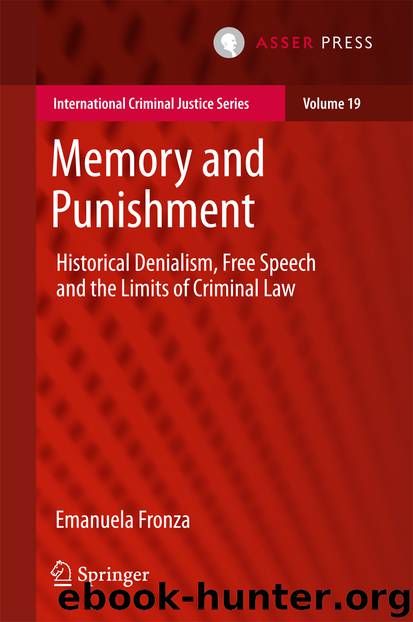Memory and Punishment by Emanuela Fronza

Author:Emanuela Fronza
Language: eng
Format: epub
Publisher: T.M.C. Asser Press, The Hague
A Hierarchy of Memories ?
According to the judges of the Chamber, Holocaust denial and denial of the Armenian Genocide are to be distinguished by using the criteria of a pressing social need, which is different from and not simply attributable to the need to punish hate speech and violence. This leads to duplicity when balancing rights: free speech , which prevails in the case of the Armenian genocide , and the prohibition of discrimination, which takes precedence in the case of the Holocaust based on the fight against anti-Semitism. Thus, a clear hierarchy of historical memories emerges, which translates into a differentiation of treatment.124
What differentiates the Holocaust and its underlying anti-Semitism from other crimes against humanity is its historical character as the ‘founding memory’ of the values enshrined in the UN Charter and in the post-war constitutions: but can those same values justify this kind of hierarchy among memories?
This perspective was outlined in the 2013 ruling and then confirmed in the Grand Chamber’s 2015 judgment. This very rich and complex decision (including the dissenting opinions) echoes the Chamber’s ruling but with a different line of argumentation. It should be noted that the problematic issue of ‘general consensus ’ is absent, at least explicitly. However, the ruling insists strongly on the context of Perinçek ’s statements and on the greater lapse of time between them and the crimes in question, thus making the need to punish denialist statements about the Armenian Genocide in a democratic society circumstantially dependent.This is particularly relevant with regard to the Holocaust. For the Court , the justification for making its denial a criminal offence lies not so much in that it is a clearly established historical fact but in that, in view of the historical context in the States concerned […] its denial, even if dressed up as impartial historical research , must invariably be seen as connoting an antidemocratic ideology and anti-Semitism. […] By contrast, it has not been argued that there was a direct link between Switzerland and the events that took place in the Ottoman Empire in 1915 and the following years.125
Download
This site does not store any files on its server. We only index and link to content provided by other sites. Please contact the content providers to delete copyright contents if any and email us, we'll remove relevant links or contents immediately.
The Borden Murders by Sarah Miller(4327)
The Secret Barrister by The Secret Barrister(3713)
Police Exams Prep 2018-2019 by Kaplan Test Prep(2550)
Coroner's Journal by Louis Cataldie(2482)
The Splendid and the Vile by Erik Larson(2476)
Terrorist Cop by Mordecai Dzikansky & ROBERT SLATER(2081)
A Colony in a Nation by Chris Hayes(1937)
My Dark Places by James Ellroy(1931)
The Art of Flight by unknow(1880)
Black Klansman by Ron Stallworth(1798)
Objection! by Nancy Grace(1786)
A Life of Crime by Harry Ognall(1733)
The New Jim Crow by Michelle Alexander(1706)
Anatomy of Injustice by Raymond Bonner(1671)
American Prison by Shane Bauer(1661)
Invisible Women by Caroline Criado Perez;(1643)
Whoever Fights Monsters by Robert K. Ressler(1621)
Obsession (The Volkov Mafia Series Book 1) by S.E Foster(1581)
A is for Arsenic: The Poisons of Agatha Christie (Bloomsbury Sigma) by Kathryn Harkup(1549)
